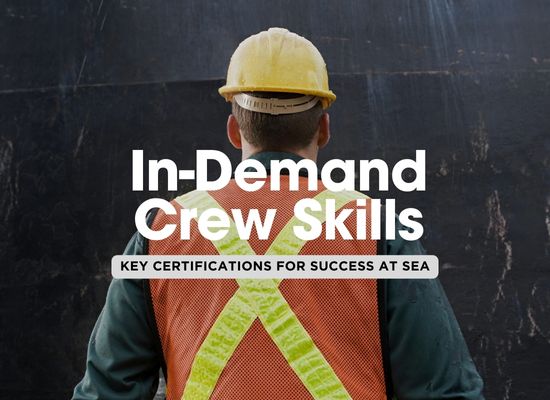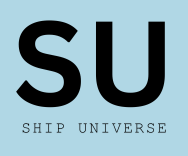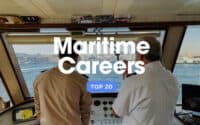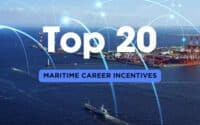The 30 Most In-Demand Maritime Certifications

Maritime shipping is the cornerstone of global trade, and the skills of its crew are fundamental to the industry’s safety, efficiency, and sustainability. Certifications in maritime shipping not only ensure compliance with international regulations but also equip seafarers with specialized knowledge and abilities. This guide explores the 30 most in-demand certifications in the maritime industry.

1. 🌊 STCW Basic Safety Training (BST)
Description: A mandatory certification for all seafarers, this course provides essential training in personal survival, fire prevention, first aid, and social responsibilities.
Why It’s Important: Ensures crew members can handle emergencies and contribute to onboard safety.
Who Needs It: All crew members, regardless of their position.
Duration: Typically 5 days.
Renewal Requirements: Every 5 years.
2. 🩺 Seafarer Medical Certificate (e.g., ENG1)
Description: Certifies that a seafarer is medically fit to work at sea. This includes assessments of physical and mental health.
Why It’s Important: Ensures that crew members are capable of performing their duties without endangering themselves or others.
Who Needs It: All seafarers.
Duration: Valid for up to 2 years.
Issued By: Accredited maritime medical professionals.
3. 📡 Global Maritime Distress and Safety System (GMDSS) Operator Certificate
Description: Focused on operating communication equipment used in emergencies, such as distress signals and safety alerts.
Why It’s Important: Critical for ensuring ship-to-ship and ship-to-shore communication in emergencies.
Who Needs It: Radio operators and deck officers.
Duration: Typically 2 weeks of training.
Renewal Requirements: As per regulatory updates or changes in equipment.
4. 🗺️ Electronic Chart Display and Information System (ECDIS) Training
Description: Training on the use of electronic navigational charts and systems that replace traditional paper charts.
Why It’s Important: Mandatory for navigation officers on vessels with ECDIS systems to ensure safe passage.
Who Needs It: Deck officers and navigators.
Duration: 5-7 days.
Renewal Requirements: Refresher courses as needed.
5. 🚨 Proficiency in Survival Craft and Rescue Boats (PSCRB)
Description: Covers the operation, launching, and handling of survival craft and rescue boats in emergencies.
Why It’s Important: Prepares crew to manage evacuation and rescue operations effectively.
Who Needs It: Crew responsible for operating survival craft or rescue boats.
Duration: Approximately 4 days.
Renewal Requirements: Every 5 years.
6. 🔥 Advanced Fire Fighting
Description: Provides advanced training for managing onboard fire emergencies, including coordination and use of firefighting equipment.
Why It’s Important: Enables crew to effectively contain and extinguish fires in high-risk maritime environments.
Who Needs It: Officers and crew with fire management duties.
Duration: Typically 5 days.
Renewal Requirements: Every 5 years or as required by the flag state.
7. 🛳️ Certificate of Competency (Deck Officer)
Description: A qualification for deck officers, covering navigation, cargo handling, and ship operations. Levels include Officer of the Watch (OOW), Chief Mate, and Master.
Why It’s Important: Essential for progression in deck department roles and ensures regulatory compliance.
Who Needs It: All deck officers.
Duration: Depends on the level; ranges from a few months to a year of coursework and exams.
Renewal Requirements: Every 5 years, with required sea service.
8. ⚙️ Certificate of Competency (Engineer Officer)
Description: A qualification for marine engineers, focusing on propulsion systems, electrical systems, and maintenance. Levels include Third Engineer, Second Engineer, and Chief Engineer.
Why It’s Important: Ensures the safe operation and maintenance of a ship’s engine room.
Who Needs It: Engineering department personnel.
Duration: Varies by rank; includes practical and theoretical assessments.
Renewal Requirements: Every 5 years, with proof of sea service.
9. 🚁 Dynamic Positioning (DP) Operator Certificate
Description: Trains operators to manage dynamic positioning systems used to maintain vessel stability without anchoring.
Why It’s Important: Crucial for vessels like offshore supply ships, drilling rigs, and survey vessels.
Who Needs It: Crew working with dynamic positioning systems.
Duration: 4-5 weeks of training, including sea time.
Renewal Requirements: As required, often dependent on system updates.
10. 🚨 Proficiency in Designated Security Duties
Description: Provides training for crew with specific security roles, such as implementing anti-piracy measures and maintaining onboard security.
Why It’s Important: Enhances preparedness for dealing with threats like piracy or terrorism.
Who Needs It: Crew assigned to security responsibilities.
Duration: Typically 1-2 days.
Renewal Requirements: No standard renewal but may be updated with security regulations.
11. 🌍 MARPOL Awareness Training
Description: Focuses on international regulations for preventing pollution from ships, including oil, sewage, garbage, and air pollution controls.
Why It’s Important: Ensures compliance with environmental laws and promotes sustainable shipping practices.
Who Needs It: All crew members involved in operations that can impact the environment.
Duration: Typically 1-3 days.
Renewal Requirements: Updated as per MARPOL amendments.
12. 🛡️ Ship Security Officer (SSO)
Description: Provides in-depth training for those responsible for implementing and maintaining a ship’s security plan.
Why It’s Important: Ensures vessels meet International Ship and Port Facility Security (ISPS) Code requirements.
Who Needs It: Designated security officers on board.
Duration: Usually 3 days.
Renewal Requirements: As required by updates in security protocols.
13. 🚢 Tanker Familiarization Course
Description: Covers the basics of handling cargo on tankers, including oil, chemical, or gas.
Why It’s Important: Mandatory for crew working on tankers to ensure safe operations and environmental compliance.
Who Needs It: All crew members assigned to tanker vessels.
Duration: Typically 3-5 days.
Renewal Requirements: Often linked to continuous sea service on tankers.
14. 🧑⚕️ Medical First Aid
Description: Trains crew members to provide immediate first aid for injuries or illnesses that may occur onboard.
Why It’s Important: Prepares crew to respond effectively to medical emergencies when far from shore.
Who Needs It: Designated medical responders onboard.
Duration: Typically 4 days.
Renewal Requirements: Every 5 years or as per flag state requirements.
15. ❄️ Polar Code Certificate
Description: Provides training for operating vessels in polar waters, covering ice navigation, cold weather survival, and environmental protection.
Why It’s Important: Ensures safety and environmental stewardship in the Arctic and Antarctic regions.
Who Needs It: Crew on vessels operating in polar regions.
Duration: Typically 5 days.
Renewal Requirements: As required, often tied to continued polar operations.
16. 🛶 Proficiency in Fast Rescue Boats (FRB)
Description: Trains crew in the handling, launching, and recovery of fast rescue boats for emergencies.
Why It’s Important: Ensures rapid response during search and rescue operations.
Who Needs It: Crew members responsible for operating fast rescue boats.
Duration: Typically 3 days.
Renewal Requirements: Every 5 years.
17. 💻 Cybersecurity Awareness Training
Description: Focuses on protecting a ship’s digital infrastructure from cyberattacks and ensuring secure communications.
Why It’s Important: Reduces the risk of cyber threats in increasingly digitized maritime operations.
Who Needs It: All crew members using onboard technology.
Duration: 1-2 days.
Renewal Requirements: Updated as cybersecurity threats evolve.
18. 🗺️ Crowd Management Training
Description: Provides crew members with the skills to manage and ensure passenger safety during emergencies.
Why It’s Important: Crucial for maintaining order on passenger ships and ferries.
Who Needs It: Crew on passenger vessels.
Duration: 1 day.
Renewal Requirements: Typically no renewal unless regulations change.
19. 🚤 High Voltage (HV) Training
Description: Teaches safe practices for operating and maintaining high-voltage electrical systems on modern ships.
Why It’s Important: Ensures the safety of crew working with advanced propulsion and electrical systems.
Who Needs It: Engineers and electricians on vessels with high-voltage systems.
Duration: Typically 3-5 days.
Renewal Requirements: As per system or regulation updates.
20. 🌾 Food Hygiene and Handling Certificate
Description: Ensures crew are trained in the safe storage, preparation, and handling of food to prevent contamination.
Why It’s Important: Vital for maintaining the health and well-being of the crew onboard.
Who Needs It: Cooks and crew involved in food preparation.
Duration: 1-2 days.
Renewal Requirements: Refresher courses every 3-5 years.
21. 🔧 Engine Room Resource Management (ERRM)
Description: Focuses on teamwork, communication, and decision-making in the engine room to ensure safe and efficient operations.
Why It’s Important: Reduces errors and enhances coordination among engineering crew.
Who Needs It: Engineering department personnel.
Duration: Typically 3-5 days.
Renewal Requirements: As per operational or regulatory updates.
22. 🧯 Advanced Training for Oil Tanker Cargo Operations
Description: In-depth training on handling, loading, unloading, and managing oil tanker cargo safely and efficiently.
Why It’s Important: Prevents accidents and ensures compliance with safety and environmental regulations.
Who Needs It: Officers and crew working on oil tankers.
Duration: 5-7 days.
Renewal Requirements: Tied to continuous service on oil tankers.
23. 🌊 Proficiency in Maritime Search and Rescue (SAR)
Description: Equips crew with skills for search and rescue operations, including coordinating efforts with rescue services.
Why It’s Important: Enhances the ability to respond effectively to maritime emergencies.
Who Needs It: Crew responsible for emergency response.
Duration: 3-5 days.
Renewal Requirements: Every 5 years or as required.
24. 🛳️ LNG Tanker Familiarization Course
Description: Covers the basics of liquefied natural gas (LNG) tanker operations, including safety protocols and cargo handling.
Why It’s Important: Addresses the unique challenges of LNG transport and ensures safety compliance.
Who Needs It: Crew working on LNG tankers.
Duration: 3-5 days.
Renewal Requirements: Continuous sea service or updated training.
25. 🌬️ Helideck Operations Certificate
Description: Trains crew in managing helicopter landing operations, including safety protocols and communication.
Why It’s Important: Ensures safety during helicopter landings and takeoffs on vessels equipped with helidecks.
Who Needs It: Crew on offshore vessels and ships with helidecks.
Duration: 2-3 days.
Renewal Requirements: Every 5 years or as operations require.
26. 🌟 Leadership and Teamwork Skills (LTS)
Description: Provides training for officers and senior crew on effective leadership and fostering teamwork onboard.
Why It’s Important: Enhances communication, decision-making, and crew morale during operations.
Who Needs It: Officers and crew in leadership roles.
Duration: Typically 3 days.
Renewal Requirements: Periodically, depending on company policies.
27. 🛡️ Proficiency in Anti-Piracy Measures
Description: Focuses on tactics to prevent and respond to piracy incidents, including safe practices and evasive maneuvers.
Why It’s Important: Protects crew and cargo in high-risk areas.
Who Needs It: Crew operating in piracy-prone regions.
Duration: 2-3 days.
Renewal Requirements: Based on regional threat levels and operational requirements.
28. 🚢 Ballast Water Management Training
Description: Teaches compliance with ballast water treatment and discharge regulations to prevent the spread of invasive species.
Why It’s Important: Ensures adherence to international environmental standards.
Who Needs It: Crew responsible for ballast water operations.
Duration: 1-2 days.
Renewal Requirements: Periodic updates aligned with regulatory changes.
29. 🏔️ Cold Climate Operations Training
Description: Provides specialized training for operating ships in Arctic or Antarctic conditions, including ice navigation and survival techniques.
Why It’s Important: Prepares crew for extreme weather and environmental challenges.
Who Needs It: Crew on vessels operating in polar regions.
Duration: 3-5 days.
Renewal Requirements: Every 5 years or as operational needs evolve.
30. 🌐 Training for Autonomous Vessel Operations
Description: Prepares crew to oversee and manage semi-autonomous or fully autonomous ships, including troubleshooting and remote operation.
Why It’s Important: Addresses the growing trend toward automation in maritime shipping.
Who Needs It: Crew working with advanced ship systems.
Duration: Varies based on the system; typically 3-5 days.
Renewal Requirements: Updated with technological advancements.
Table Summary
| ShipUniverse: 30 In-Demand Maritime Certifications | ||||
|---|---|---|---|---|
| Certification | Description | Who Needs It | Duration | Renewal |
| STCW Basic Safety Training (BST) | Covers personal survival, fire prevention, first aid, and safety responsibilities. | All crew members | 5 days | Every 5 years |
| Seafarer Medical Certificate | Confirms physical and mental fitness for duty. | All seafarers | Varies (medical examination) | 2 years |
| GMDSS Operator Certificate | Training to operate communication and distress systems. | Radio operators, deck officers | 2 weeks | As required by updates |
| ECDIS Training | Teaches navigation using electronic chart display systems. | Deck officers | 5-7 days | Refresher as needed |
| Proficiency in Survival Craft and Rescue Boats (PSCRB) | Training to operate and manage survival craft and rescue boats. | Crew responsible for rescue boats | 4 days | Every 5 years |
| Advanced Fire Fighting | Provides advanced skills for firefighting and managing teams. | Officers and firefighting crew | 5 days | Every 5 years |
| Certificate of Competency (Deck Officer) | Required for navigation, cargo handling, and ship operations. | Deck officers | Varies (months) | Every 5 years |
| Dynamic Positioning (DP) Operator Certificate | Training for operating vessels with dynamic positioning systems. | Crew on DP vessels | 4-5 weeks | As needed |
| Polar Code Certificate | Prepares crew for operations in polar regions. | Crew on polar routes | 5 days | Every 5 years |
| Crowd Management Training | Teaches managing passenger safety during emergencies. | Crew on passenger ships | 1 day | No standard renewal |
| High Voltage (HV) Training | Focuses on the safe operation and maintenance of high-voltage electrical systems on modern ships. | Engineers and electricians | 3-5 days | As needed |
| Food Hygiene and Handling Certificate | Ensures crew follow food safety and hygiene standards to prevent contamination. | Cooks and crew handling food | 1-2 days | Every 3-5 years |
| Engine Room Resource Management (ERRM) | Focuses on teamwork, communication, and decision-making in the engine room for safe operations. | Engineering crew | 3-5 days | As needed |
| Advanced Training for Oil Tanker Cargo Operations | Provides in-depth training for safely handling and transporting oil cargoes. | Officers and crew on oil tankers | 5-7 days | Tied to service on tankers |
| Proficiency in Maritime Search and Rescue (SAR) | Equips crew with the skills to coordinate and conduct search and rescue operations effectively. | Emergency response crew | 3-5 days | Every 5 years |
| LNG Tanker Familiarization Course | Covers the basics of LNG-specific cargo handling and safety protocols. | Crew on LNG tankers | 3-5 days | Tied to service on LNG tankers |
| Helideck Operations Certificate | Prepares crew to safely manage helicopter landing and takeoff operations. | Crew on vessels with helidecks | 2-3 days | Every 5 years |
| Leadership and Teamwork Skills (LTS) | Teaches effective leadership and teamwork strategies for officers and senior crew. | Officers and senior crew | 3 days | Periodic, per company policy |
| Proficiency in Anti-Piracy Measures | Trains crew to implement tactics and practices to prevent and respond to piracy threats. | Crew in piracy-prone regions | 2-3 days | As required |
| Ballast Water Management Training | Covers procedures for proper ballast water handling to prevent ecological damage. | Crew responsible for ballast operations | 1-2 days | As required by regulations |
| Cold Climate Operations Training | Specialized training for operating vessels in Arctic and Antarctic conditions. | Crew on polar routes | 3-5 days | Every 5 years |
| Training for Autonomous Vessel Operations | Prepares crew to manage and troubleshoot semi-autonomous and autonomous ships. | Crew on autonomous vessels | 3-5 days | As technology evolves |
| Medical First Aid | Provides basic training for addressing medical emergencies onboard. | Designated first-aid responders | 4 days | Every 5 years |
| Advanced Fire Fighting | Advanced training for managing onboard fire emergencies, including leadership in firefighting operations. | Officers and firefighting crew | 5 days | Every 5 years |
| Proficiency in Fast Rescue Boats (FRB) | Training for operating, launching, and recovering fast rescue boats in emergency scenarios. | Crew responsible for rescue operations | 3 days | Every 5 years |
| Proficiency in Designated Security Duties | Equips crew with skills for maintaining ship security and responding to threats. | Crew with security responsibilities | 1-2 days | As required |
| Tanker Familiarization Course | Introduces crew to the basics of tanker operations, including oil, chemical, and gas handling. | Crew on tankers | 3-5 days | Tied to tanker service |

Do you have a Maritime Product or Service that may be of interest to Shipowners? Tell us about it here!
Do you have feedback or insights? Please reach out to editor @ shipuniverse.com



